Program

Schedule:

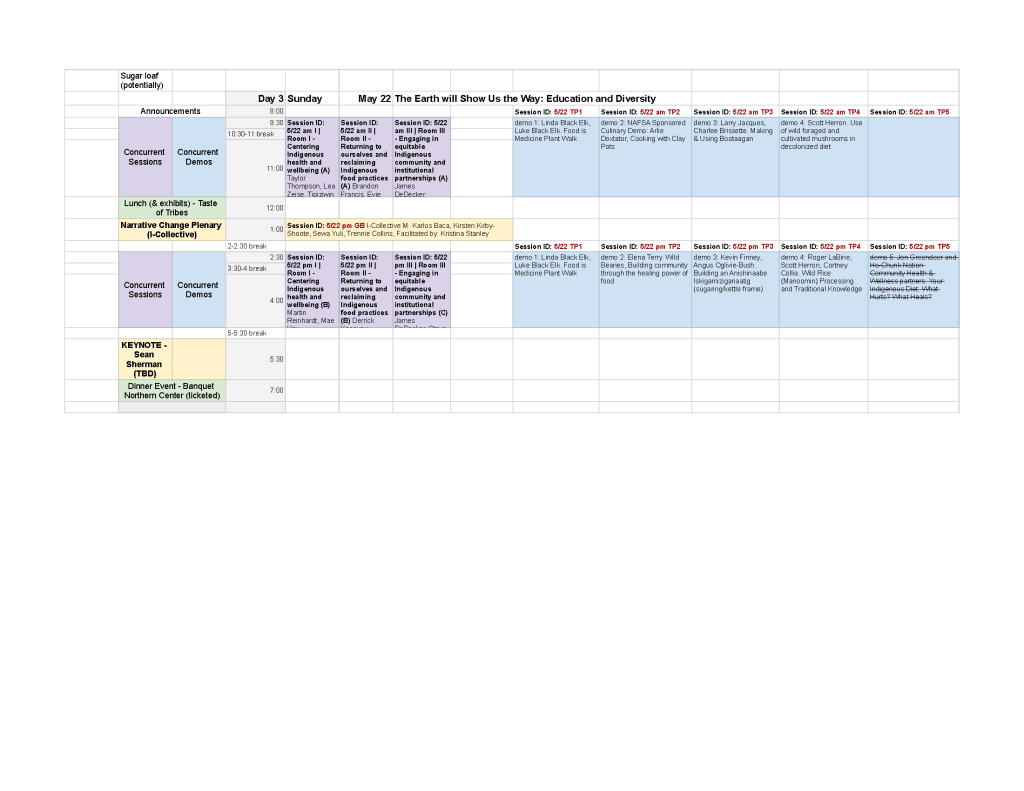
Full Program:

The virtual Symposium Sampler was hosted in September 2021 following postponement of the full event. Most recordings are available through the IAC E-Learning Platform on MightyNetworks.


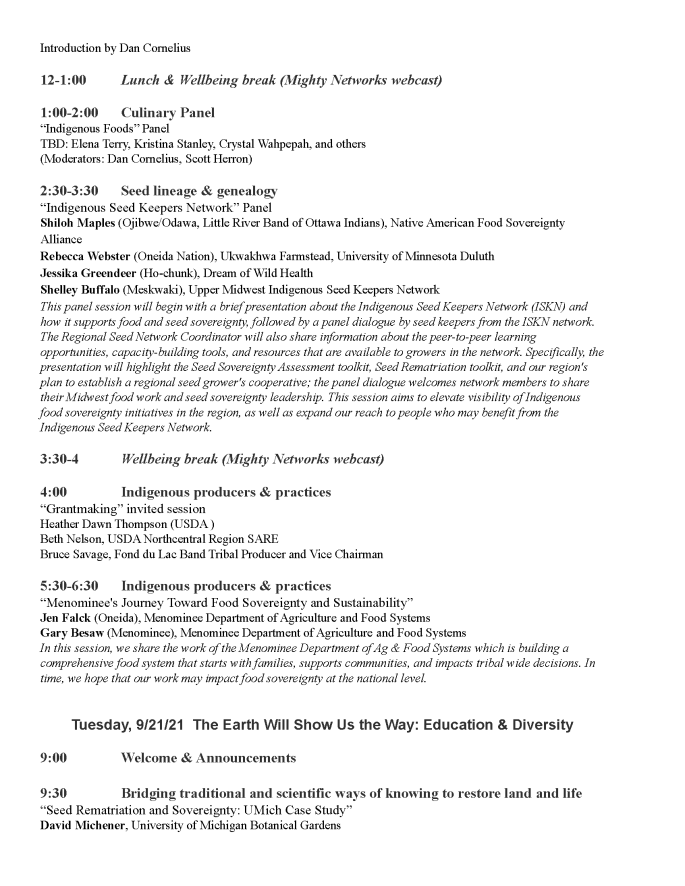

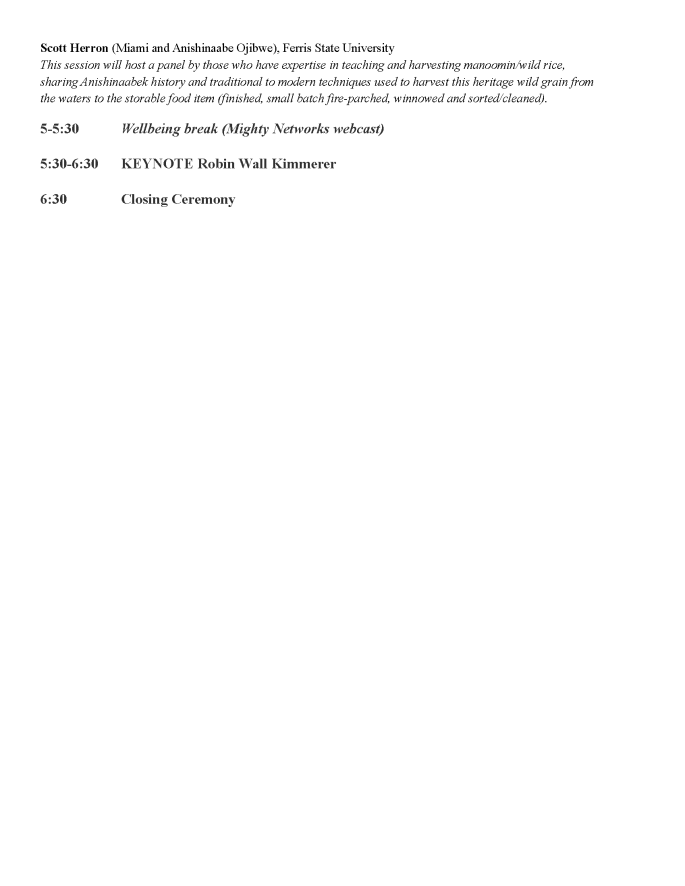
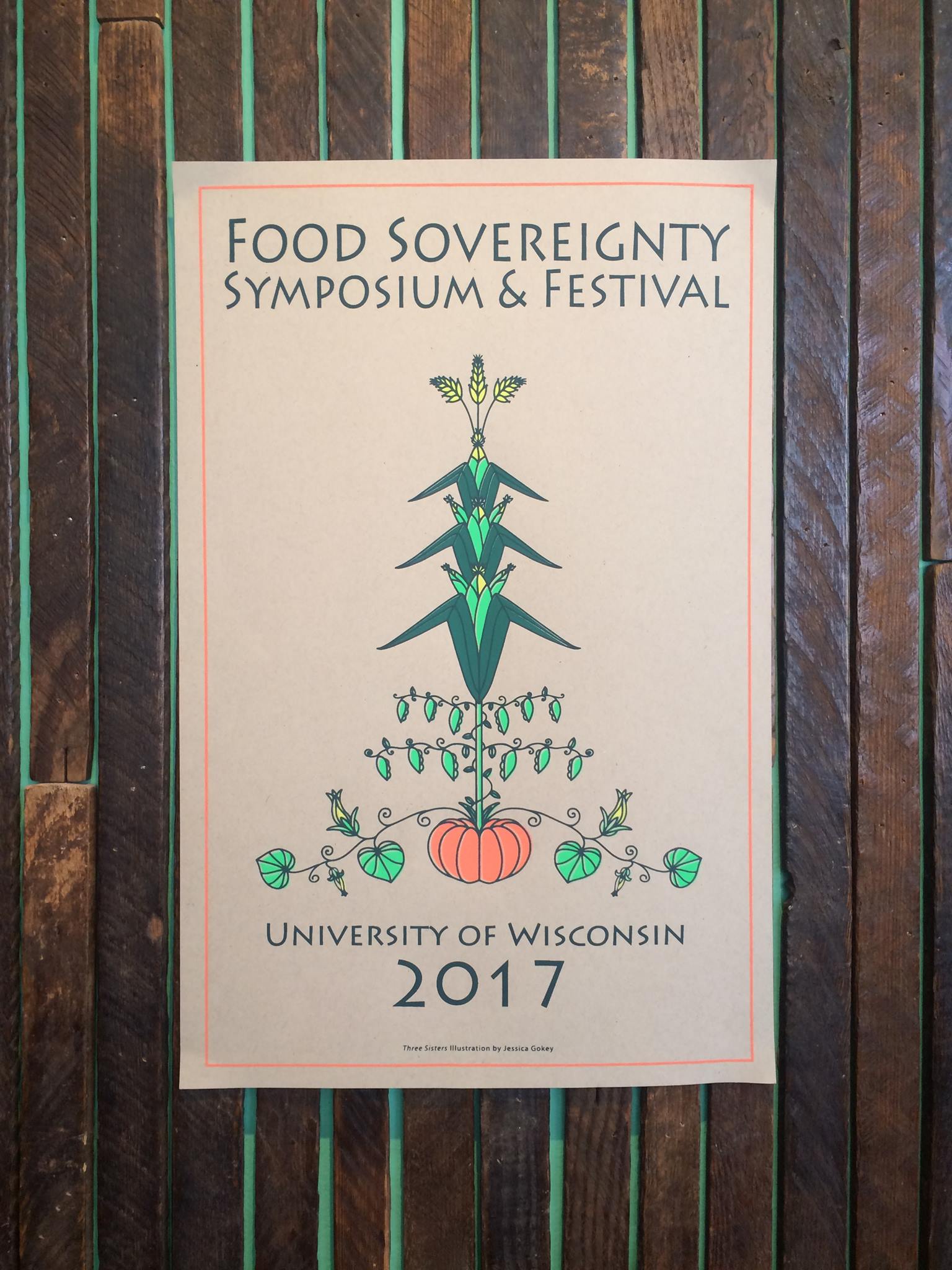
The Food Sovereignty Symposium & Festival was held in Madison, WI on March 10-12, 2017, featuring a wide range of speakers, demonstration, and meals on the UW-Madison campus and in other parts of the city. We’d love to hear your thoughts and have created this short survey to collect feedback. The event’s livestream is available at WATCH IT HERE AT IndianCountryTV.

The festival would not have been possible without amazing food from so many Great Lakes Indigenous food producers that included
Most of these products are available at Native Market & Gallery located at 1732 Fordem Ave in Madison. Shipping is available for most items as well.
The Thursday evening opening American Indian Foods Pop-up Dinner was held at Robinia Courtyard through the generous assistance of Jon Reske.
Beginning with appetizers of smoked whitefish and tepary bean dip and buffalo and cranberry pemican, attendees enjoyed Three Sisters Posole and a cholla and wild rice Indigenous salad, followed by roast duck served with Kanastole (Oneida cornbread). A mesquite cake with berries and maple frosting capped off the first part of the evening.
However, the chefs continued their cooking with a Late Night Pop-up at Forequarter where diners were treated roast quail, Native tostadas, and cornbread hushpuppies with smoked whitefish and tepary bean dip.

Friday morning Genetic Sovereignty Panel came quick after the late night of amazing foods. Rowen White from Sierra Seed Cooperative joined Julie Dawson and Claire Luby from UW-Madison to share current seed keeping initiatives and strategies for protect Indigenous seed stocks and the communities that have cared for them for so many generations.
You can view the Dawson presentation here: Dawson_2017_08_10_Seed Sovereignty
You can view the Luby presentation here: Luby_Food Sovreignty Symposium Mar 2017

Friday afternoon Food Sovereignty Symposium focused on legal and policy issues, with presentations from Rowen White on legal aspects of seed sovereignty, Abi Fain covering the Tribal Food Code Project, Dan Cornelius and Brian Yazzie discussing Standing Rock, and Martin Reinhardt providing an overview of Great Lakes historical treaties and their impacts on today’s regional food sovereignty efforts. Friday concluded with a whitefish fish fry dinner at The Crossing.
See Martin Reinhardt’s presentations here: decolonizing_our_diet
and here: eating_our_words

The “Taste of the Tribes,” held at the Wisconsin Institutes for Discovery on Saturday morning, provided an opportunity for the Native chef team to highlight their skills, while Rowen White provided a more general overview of Indigenous seed keeping and Elizabeth Hoover shared perspectives on the today’s Indigenous food sovereignty movement.
One of the best parts of the “Taste of the Tribes” was the opportunity for more direct interaction with the chefs, as well as a great opportunity to network with others attending the event.
Saturday also included hands-on demonstrations on topics ranging from seed cleaning to grinding corn flour using a traditional botagen (giant wood pestle & mortar) to cooking a batch of black walnut sap down to syrup.
Saturday afternoon’s Symposium also featured numerous panels on Health Aspects of Food Sovereignty, Access to Land & Markets, Cuisine of this Place, Farm Labor, and Food Sovereignty & the Wisconsin Idea.
Saturday’s events concluded with the Food Sovereignty Indigenous Foods Banquet in partnership with Family Farm Defenders at Union South. The multi-course meal included a fresh micro-green and wild rice salad, traditional Oneida corn soup, braised buffalo over corn polenta served with roast veggies and Native pesto, and a wild rice, squash, and chia seed pudding.

UW Housing’s Dining Services helped conclude the event with a brunch featuring Indigenous ingredients that followed a campus landscape tour covering the area’s Native American history. A chef’s panel at the final brunch addressed a range of topics related to today’s revival in the Indigenous foods and Food Sovereignty movement.
And we’d like to extend a huge thank you to our hosts, partners, and sponsors.
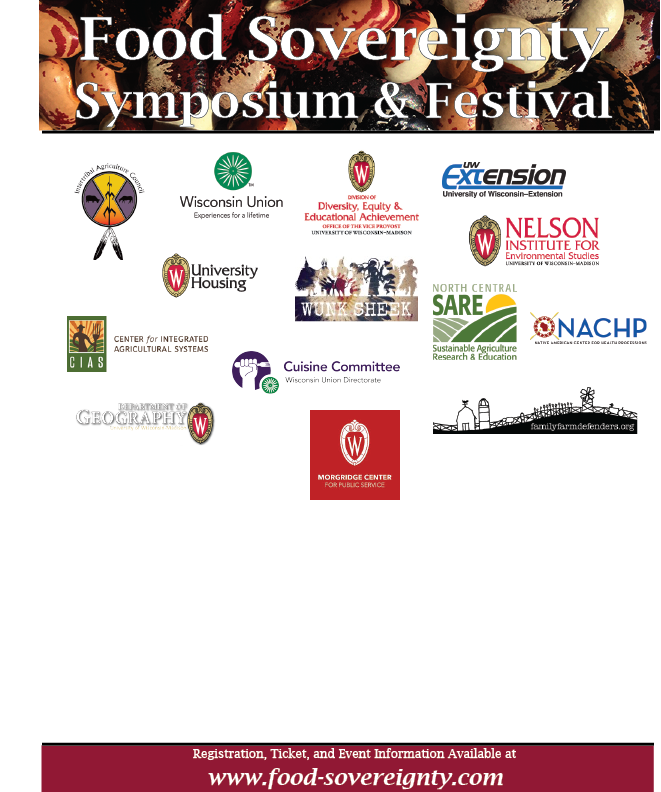
The American Indian Foods Pop-up Dinner at Robinia Courtyard was a huge success. Our Native chef team prepared five courses featuring an array of Indigenous foods.
The menu included 1) Smoked Whitefish & Tepary Bean Dip and Buffalo & Cranberry Pemican, 2) Posole Three Sisters Soup, 3) Indigenous Salad with Wild Rice and Cholla Cactus Buds, 4) Roast Duck & Kanastole (Oneida Cornbread), and 5) Wild Rice Cake with Berries and Walnut Frosting.
We would also like to offer a huge thank you to Jonathon Reske and Robinia Courtyard for graciously hosting the event.
Kristina Stanley, a member of the Red Cliff Band of Lake Superior Objiwe, is the owner of Brown Rice & Honey and winner of Madison Magazine’s 2017 gold medal winner for best Artisan Food Producer. The concept of her catering business is that sweet treats don’t have to be nutritionally void. (So go ahead, have another.) Stanley, who is also director of catering and events for Food Fight’s Market Street Diner in Sun Prairie, specializes in vegan and gluten-free cookies, cakes, muffins and other confections, and she’s constantly experimenting with alternative grains and sweeteners for her treats.

Tashia Hart has a Bachelor of Arts Degree with a focus in Biology from Bemidji State University. Chef Tashia is Anishinaabe from the Red Lake Reservation in northern Minnesota. As a Culinary Ethnobotanist for The Sioux Chef team, she is an expert in identifying wild and indigenous plants for culinary usage along with discovering new uses and techniques for the bounty of wild flavors all around us. This background is valuable in her knowledge of foods both in the field and in the kitchen.

Tashia Hart is also the author “Girl Unreserved”, a very intimate coming-of-age narrative told from the perspective of a “mixed-blood” girl from a Chippewa Indian reservation in Northern Minnesota available on Amazon.com HERE.
Chef M. Karlos Baca founded the Taste of Native Cuisine, an Indigenous Chefs collective in 2011, and in connection with the Southern Ute Cultural Center & Museum, as a means to reintroduce and revitalize Indigenous Foodways through education, foraging, and indigenous menu tastings. His work has been featured on Zagat Foodways: 10 Meals That Define America.
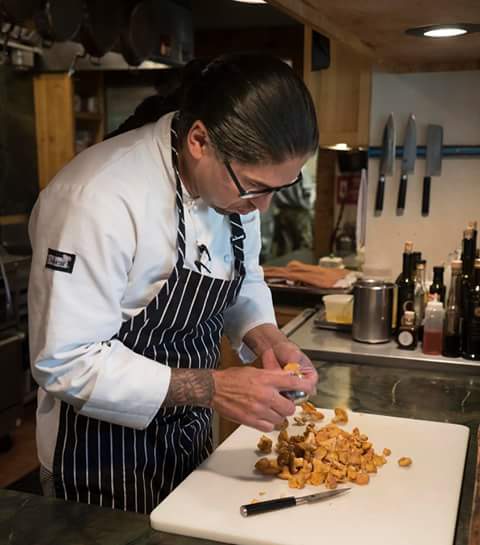
Karlos recently partnered with The Sioux Chef team in hosting Yúaarükapì “Foods of our Natural World” Special 5-Course Indigenous Pop-up Dinner in the Minneapolis area. Here’s a glimpse of what that amazing dinner entailed and a preview of what’s in store for next week’s Food Sovereignty Symposium & Festival.
Dr. Martin Reinhardt, an Anishinaabe Ojibway citizen of the Sault Ste. Marie Tribe of Chippewa Indians from Michigan, is a tenured associate professor of Native American Studies at Northern Michigan University where he teaches courses in American Indian education, tribal law and government, and sociology.
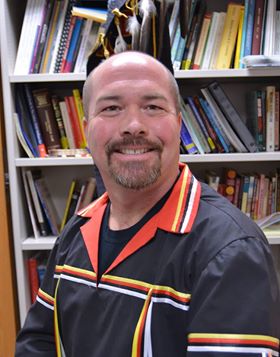
Professor Reinhardt’s current research focuses on revitalizing relationships between humans and Indigenous plants and animals of the Great Lakes Region. He has a Ph.D. in Educational Leadership from the Pennsylvania State University, where his doctoral research focused on Indian education and the law with a special focus on treaty educational provisions.
Among numerous other projects, Prof. Reinhardt was primary investigator on the Decolonizing the Diet Project (DDP) that focused on the impacts of a traditional Indigenous Great Lakes diet. DDP participants ate varying degrees of this Indigenous diet during the study period, resulting in general overall improvement in physical health while learning how to obtain and cook those regional Indigenous foods on a regular basis. The project also published the Decolonizing Diet Project Cookbook.
Ben Jacobs is co-owner of Tocabe: An American Indian Eatery, based in Denver, Colorado. Tocabe first opened its doors in December 2008 and added its second location in 2015 and a food truck last year. Tocabe is the only American Indian owned and operated restaurant in Metro Denver. Ben is a Tribal member of the Osage Nation located in north eastern Oklahoma.

In addition to his work in founding Tocabe, Ben has actively worked to promote American Indian nutrition and healthy eating through workshop in Native communities, as well as advocacy in the Denver area. Part of his philosophy is a “Native first” approach to local foods that places heightened priority in sourcing from Tribal food producers.
Brian Yazzie (aka Yazzie The Cook) is a Navajo Chef from Dennehotso, AZ on the Navajo Nation. Chef Yazzie has a degree in Associate in Applied Science (AAS) in Culinary Arts from Saint Paul College. He caters private events and provides cooking demonstrations utilizing healthy Indigenous foods free of colonial ingredients.

As the Chef de Cuisine at The Sioux Chef, he enjoys collaborating with other cooks and chefs on Indigenous food projects. Chef Yazzie aspires to explore old and new delectable Indigenous cuisine creations and to educate all populations on the health benefits and possibilities of an Indigenous diet. Brian has previously partnered with the Intertribal Agriculture Council on Great Lakes Intertribal Food Summits at Gun Lake Pottawatomi and Red Lake, as well as the Taste of Madison.